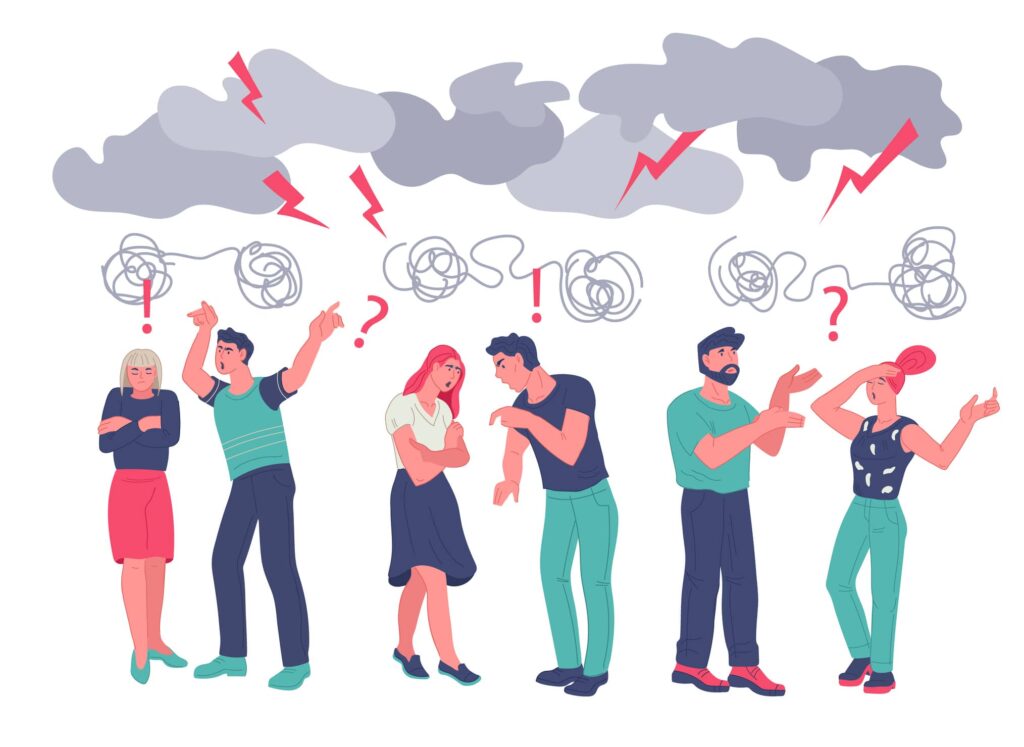Navigating Family Relationships Among Political Differences

Chicago, known for its historically deep Democratic roots (including hosting the 2024 Democratic National Convention), is home to residents with widely varying political views. Moreover, residents of Chicago and their families, many of whom are in the Chicago suburbs and scattered throughout the country, represent wide divides in political ideology. In this polarized climate, political differences can strain even the closest family relationships.
Politics has often been labeled as an “off-topic” subject in social settings due to its potential to ignite heated arguments. However, the current political climate, especially in a presidential election year, makes it increasingly challenging to avoid political discussions.
News outlets continuously highlight political developments, pushing these conversations into our daily lives. This omnipresent political discourse can seep into family gatherings, turning a once-peaceful meal into a battleground of conflicting ideologies.
The Social Bubble Phenomenon
It’s easy to find ourselves in a “social bubble,” surrounded by people who share our interests and political beliefs. Social media algorithms reinforce these bubbles, showing us content that aligns with our views and shielding us from opposing perspectives.
Further, confirmation bias (a common bias in human thinking) leads people to seek out, interpret, and remember information in a way that reinforces their existing beliefs, while often ignoring or dismissing information that contradicts those beliefs (For example: seeking out friends or news outlets that align with your beliefs.).
But despite this social bubble, our family members and even some friends can hold vastly different political beliefs. This diversity within our intimate circles can lead to uncomfortable interactions and potential conflicts.
To Avoid or Not Avoid Political Conversations?
Families may choose to avoid political conversations as a means of preserving harmony. In some cases, this might be the best option to prevent disputes. Skipping a family gathering or delaying a visit might seem extreme, but it can sometimes be necessary if a political discussion feels inevitable and potentially explosive.
However, opting out of political conversations may not be a viable option or may even be contrary to your values. Political decisions, whether discussed or not, have direct and significant impacts on people’s well-being and safety.
Human rights groups even argue that maintaining a state of “neutrality” on many political issues is a privilege not afforded to all. For marginalized groups, discussing politics is not just about opinions but about their very rights and existence.
If it’s right for you to engage in political conversation with family (in or out of family therapy) that have tremendously different political views, consider these strategies:
Navigating Difficult Political Conversations
- Keep Conversations 1:1 – Larger groups can elicit more emotional responses, making it harder to have a constructive dialogue. One-on-one conversations, if possible, tend to be more manageable and less confrontational.
- First Seek to Understand – Start from a place of curiosity and a genuine desire to understand why the other person holds their beliefs. Avoid the temptation to “win” the conversation. Listening to the person’s interest might create more room to build empathy or even explore resolutions that weren’t previously apparent. Offering positive feedback when you agree can also create a more open and respectful dialogue.
- Pay Attention to Body Language – Nonverbal cues play a significant role in communication. Avoid speaking too loudly or yelling. Maintain an open posture and try to stay relaxed, which can help de-escalate tension and lead to a more meaningful conversation.
- Be Willing to End the Conversation – Recognize when a conversation is no longer productive and be willing to end it. It’s okay to revisit the topic later when emotions have cooled. Remember, an emotionally flooded brain can’t access brain centers that allow you or others to reason. Given that, how productive is the conversation going to be when anyone is emotionally flooded?
After Conversation Considerations
Engaging in political conversations with family members can be emotionally taxing, but it also offers an opportunity for growth and deeper understanding. After such discussions, family therapy principles encourage people to take time to reflect on various aspects to process the experience constructively. Consider these strategies from a family therapist:
Acknowledge Your Feelings
It’s important to recognize and acknowledge your emotions after a political conversation. You might feel frustrated, angry, hurt, or even betrayed, especially if the discussion touched on deeply personal issues. Give yourself permission to feel these emotions without judgment. Understanding and accepting your feelings is the first step toward processing them in a healthy way.
Practice Self-Compassion
Be kind to yourself. Political conversations can sometimes leave you questioning your own beliefs and values (or the future of your relationships). Practice self-compassion by reminding yourself that it’s okay to feel challenged and that you’re not alone in experiencing these conflicts. Engaging in political dialogue requires courage and vulnerability, so acknowledge your efforts and give yourself credit for trying to bridge differences.
Engage in Relaxation Techniques
After a heated political discussion, it can be beneficial to engage in relaxation techniques to help calm your mind and body. Practices such as deep breathing, meditation, or yoga can help reduce stress and bring a sense of calm. These activities can help you regain your emotional equilibrium and prevent the conversation from impacting your mental health long-term.
Engage in Activities That Bring You Joy
After a challenging conversation, take time to engage in activities that bring you joy and relaxation. Whether it’s reading a book, going for a walk, listening to music, or spending time with loved ones who share your values, doing something enjoyable can help lift your spirits and remind you of the positive aspects of life.
Put Yourself in Their Shoes
Understanding another person’s perspective is crucial in fostering empathy and being effective in future conversations. Try to imagine the world from their viewpoint, considering their life experiences, social influences, and personal values. What historical or cultural contexts might shape their beliefs?
What personal experiences have they had that might lead them to their conclusions? By exploring these questions, you can develop a more nuanced understanding of why they hold certain political views. This exercise not only builds empathy but also helps you see beyond the surface level of their opinions, uncovering the deeper motivations and fears that might drive their political stance.
Consider Why Their Opinion Feels Hurtful
It’s essential to explore why certain political views can feel personally hurtful. Reflect on the aspects of their opinion that trigger a strong emotional response in you. Is it because it challenges your core values, threatens your sense of identity, or contradicts your experiences?
For example, if a family member’s political stance seems to dismiss issues that affect marginalized communities, and you belong to one of those communities, their viewpoint likely feels invalidating and offensive. Understanding your emotional triggers can provide insights into your values and helps in setting personal boundaries and knowing when to step away from a harmful discussion.
Did Your Understanding Change?
It’s important to honestly assess whether your understanding of the issue has changed in any way. Did the conversation introduce you to new data or arguments that challenged your preconceived notions? Even if you didn’t change your overall stance, did you gain a more comprehensive view of the issue? Did you find additional clarity in your beliefs?
This self-reflection can help you recognize the complexity of political issues. It also demonstrates intellectual humility and openness, traits that are essential for constructive dialogue and personal growth.
Continual Self-Reflection
Continual self-reflection is vital for personal growth and maintaining healthy relationships. Regularly check in with yourself about how political conversations with family members are affecting you. Are they causing significant stress or anxiety? Are there patterns in these discussions that need addressing?
Reflecting on these questions can help you make informed decisions about how to engage in future political conversations. It also ensures that you’re prioritizing your mental health while navigating complex family dynamics.
Moving Forward
After reflecting on the conversation, think about how you would like to proceed with these conversation topics in the future. Consider strategies for future interactions that prioritize mutual respect and understanding.
This might involve setting boundaries around certain topics, finding neutral ground for discussions, engaging in family therapy, or agreeing to disagree on contentious issues. Maintaining family bonds doesn’t mean you have to compromise your values, but it does require a commitment to empathy, patience, and open communication.
Set Boundaries
If you find that political conversations with certain family members consistently cause distress, it might be necessary to set boundaries. This could mean limiting the frequency of these discussions or agreeing to avoid specific topics altogether. Setting boundaries is a form of self-care that protects your mental and emotional health.
Professional Support Can Help!
Consider seeking professional support if political conflicts are causing significant strain on you or your family relationships. An individual therapist can help you manage your personal experience within family political conflict.
A family therapist can provide tools and strategies to manage conflicts within the family effectively. They can help create a safe space for open dialogue and guide families in finding common ground.
Family therapy can also help people understand their emotional triggers, develop healthier communication patterns, and reduce harm. At Tandem Psychology in Chicago’s Lakeview neighborhood, our experienced individual and family therapists are skilled in navigating political conflicts and ready to help you!
This blog is made for informational and educational purposes only. It is not medical advice. The information in this blog is not intended to (1) replace a one-on-one relationship with a qualified licensed health care provider, (2) create or establish a provider-patient relationship, or (3) create a duty for us to follow up with you.



